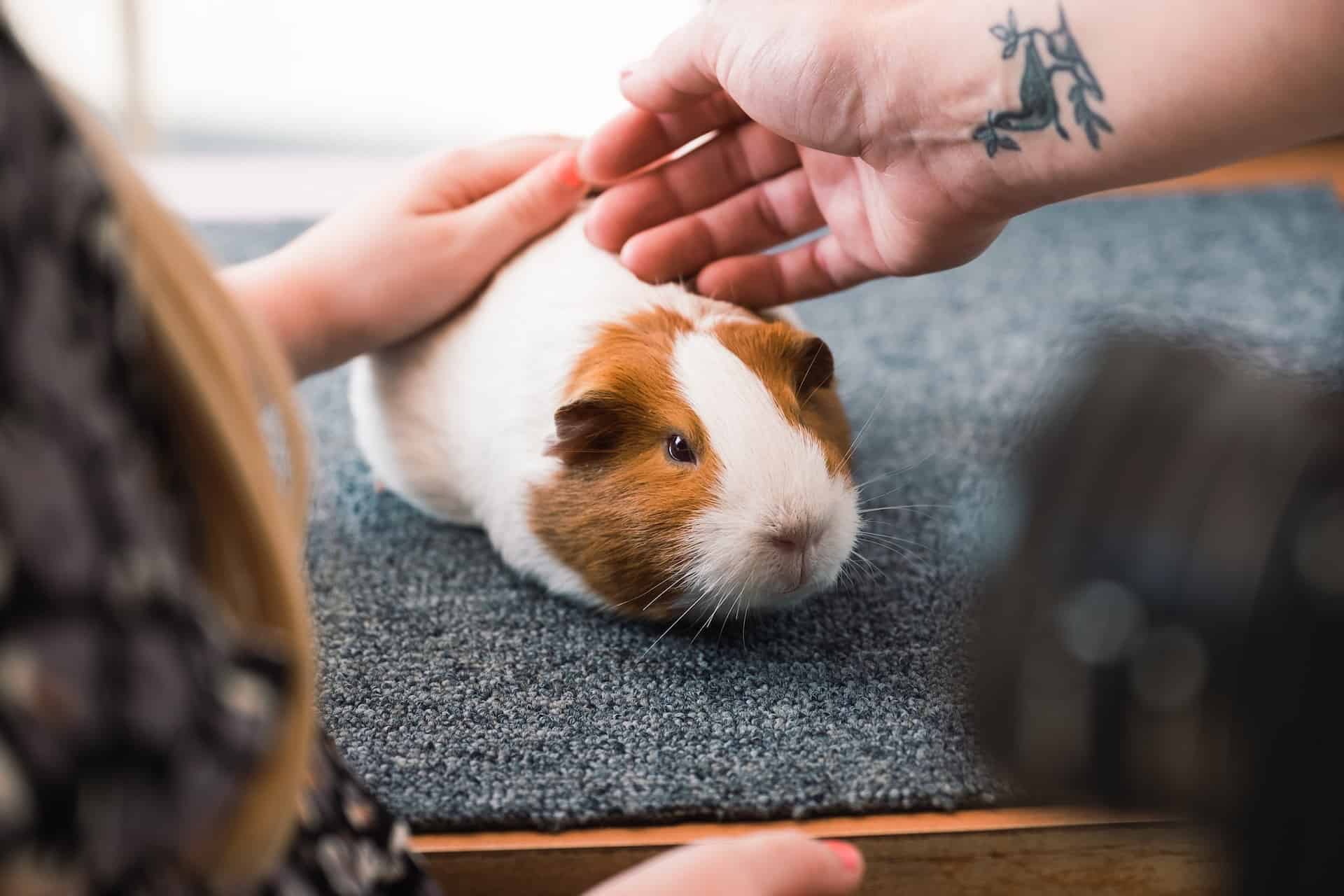| TL;DR: Guinea pigs have longer pregnancies than other rodents, lasting 59 to 72 days. The number of days depends on the number of pups a saw carries. To ensure a smooth pregnancy, inform your vet that your guinea pig is expecting and provide a stress-free environment, gentle handling and quality food and water. Guinea pigs mate early. Males should be separated from the mother not later than three weeks after birth to avoid a new pregnancy. |
If you’re a first-time pet parent, the experience of guinea pig pregnancy can be both thrilling and daunting.
Breeding guinea pigs is a complex process that can pose risks to the mother and her pups. However, accidents happen. More often than not, two guinea pigs guaranteed to be of the same sex are anything but. You may have unknowingly acquired a pregnant piggy, or your guinea pigs may have matured faster than expected.
Whatever the reason, there’s no need to feel overwhelmed. In this article, we will discuss the signs of a positive guinea pig pregnancy, pre and post-natal care and provide tips to help you easily navigate the process.
| How Long Are Guinea Pigs Pregnant? Guinea pigs have long pregnancies compared to other rodents. While mice are pregnant for only 19 to 21 days, guinea pigs can be pregnant for 59 to 72 days. Interestingly, the duration of a guinea pig’s pregnancy depends on how many pups a sow (a female guinea pig) carries. The more pups she has, the shorter her pregnancy will be. So, a guinea pig carrying a large litter might be pregnant for around 60 days, while with a smaller litter, she might be pregnant for approximately 70 days. |
At What Age Can a Guinea Pig Get Pregnant?
Sows should be sexually mature but not too old to give birth for the first time, ideally between 2 – 7 months old. Beyond 7 months, it is normal for the guinea pigs’ symphysis (the joint connecting the two pelvic bones) to stiffen and cause severe, life-threatening complications during delivery.
While guinea pigs’ estrous are more common during spring, they can become fertile anytime. The estrous cycle lasts 16 days and female guinea pigs are most often fertile during nighttime hours.
4 Signs of Pregnancy in Guinea Pigs
Detecting pregnancy in guinea pigs can be tricky, as the early signs of gestation are often subtle. By the time a sow’s abdomen begins to show, she may well be into pregnancy. Still, there are some telltale signs to look for.
But before jumping into those, if you suspect your piggy is pregnant, it’s best to treat her as though she is until confirmed otherwise. Take extra precautions and handle her with utmost care.
Now, without further ado, some common cues of pregnancy normally include:
???? Contact with an unneutered boar
If your sow has been in contact with a male guinea pig that has not been neutered, she may have become pregnant. Boars can be sexually active as early as three weeks of age but cannot be sterilized until they reach four months. Moreover, they can be fertile for a few weeks after the surgery.
⚖️ Weight gain
This is one of the first physical signs of pregnancy. Regular weighing is strongly recommended to ensure your guinea pigs’ overall health. But it comes in especially handy if you suspect pregnancy. A pregnant sow will gain a few grams daily and her belly will become noticeably larger after a few weeks.
???? Increased food and water intake
A pregnant saw will eat more than usual — sometimes up to three times her average amount — as she will feed for more than one. Expect to refill the water bottle more frequently as well. You may also notice your pregnant piggy favoring vitamin C-rich fruits and veggies over other food, as this nutrient is crucial for her and her pups’ health during gestation.
| ???? Pro Tip: Try giving your sow the normal amount of food she usually receives and observe how long it lasts. If she finishes it faster than usual, it could be a sign of pregnancy. |
???? Feeling the pups
Some little lumps will appear after two or three weeks of pregnancy. You will feel the gestating pups by gently rubbing your hand on your guinea pig’s belly.
How to Care for a Pregnant Guinea Pig
Undoubtedly, caring for pregnant piggies requires some special love and attention. Let your vet know your guinea pig is pregnant to ensure a smooth pregnancy. And make sure you have professional help in case any complications arise during or after the process.
What else can you do to care for a pregnant piggy? Let’s find out:
1. Provide a safe and stress-free environment
Stress can cause general health issues in guinea pigs, especially in a pregnant sow. She will need a quiet environment with no loud noises and reduced activity around her. However, significant changes during pregnancy can also be hard on your piggy. Changing enclosures or removing everyday toys should also be avoided, as this can also stress her.
2. Handle her with care
When handling your pregnant guinea pig, be extra gentle and cautious. She is more delicate when gestating and you want to avoid harming her and her pups. Avoid lifting her up. But if you need to do so, do it gently and support her hindquarters to protect the litter.
3. Avoid complete isolation
Piggies are social animals and should not be left alone. If there are other guinea pigs in the house, they can be moved to enclosures nearby. Showing her your love by talking and petting her also helps keep her stress level under control.
4. Provide quality food and water
Think veggies – lots of them! Your sow needs a diet rich in calcium, protein, and vitamin C. Alfalfa is a good choice over Timothy hay, as it’s more nutritious. Don’t forget to include green peppers, broccoli and kale –these veggies are excellent sources of vitamin C and will keep your pregnant piggy healthy and happy.
How To Tell When a Guinea Pig is Ready to Give Birth?
More than often, guinea pigs will give birth without you even noticing it, in a swift, quick process overnight.
However, suppose you’ve been observing your piggy’s pregnancy changes for the two-month gestation period. In that case, you’ll probably notice a time when she becomes quieter and less active than usual and might even seem more distant. This means she’s likely getting ready to give birth in the next couple of days, saving her energy for the upcoming delivery and nursing her pups.
When labor begins, the sow will squeak followed by hiccup-like sounds –those are contractions. At this point, it’s best to avoid touching her, as she may see your hand in the cage as a threat to her piglets.
The birthing process typically takes between 20 to 30 minutes and it’s important not to interfere unless your sow has difficulty delivering her pups. However, if the labor lasts longer than 30 minutes, it may be necessary to contact your vet.
Curiously, saws don’t prepare nests for their pups. Providing a hiding spot, such as a small cardboard hut, can help your sow feel more secure and create a cozy space for her babies to rest in. Adding soft fleece or other materials can also make the enclosure more comfortable for newborns.
| What You Should Do After the Babies Are Born After the pups are born, allowing the mother to care for them is important. As soon as they’re delivered, the sow will attend to them, eat their placenta and chew off the umbilical cord, diligently caring for the newborn pups. Baby guinea pigs are born curious and lively. For the first two to three weeks of their lives, they will nurse and be under the care of their mother, even if they start eating solid foods earlier — which they probably will. During this time, it’s important to help the new mom. Here’s what you can do: 1. Provide the mother and babies with nutritious food and fresh water daily Good quality pellets, fresh greens, veggies and plenty of calcium (parsley is a great source) will give her the nutrition they need. 2. When interacting with the pups, be patientYou can gently touch them after about four hours from their birth; the mother will not stop caring for them if they smell like you. But with extra care, newborn guinea pigs are extremely fragile. Reading the mother’s behavior is important, as you don’t want to stress her out. Wait at least two weeks before attempting to hold or lift the babies. 3. Keep the enclosure clean but be mindful while doing itInstead of giving it a full cleaning, gently scoop out wet or soiled shavings, dirty bedding or bits and scraps of old veggies. 4. Separate the male pups from their mothers and female siblings no later than 3 weeks of ageYes, that fast. Don’t delay this, as they can become sexually mature very young. Female guinea pigs can remain with their mothers for up to 4 weeks of age. Remember that a sow can become fertile right after delivery, so keep boars separate from sows. |
Final Thoughts
Welcoming a new litter of guinea pigs into the world is an exciting experience. Simply imagine having fluff squeaking balls running around to care for and watch as they grow.
Nevertheless, guinea pig pregnancies — especially the delivery — can present complications for the mother and the pups. Establishing a good relationship with a trusted veterinarian can help ensure a safe and smooth pregnancy for your sow and her little ones and keep your furry family healthy and happy.
So, get ready to embrace the wonder and joy of new life while taking the necessary steps to protect your precious pets. By working with your vet and following their advice, you’ll be well on your way to a successful and rewarding guinea pig pregnancy.
| Sources Quesenberry, K. E., et al .(2022). Breeding and Reproduction of Guinea Pigs. merckvetmanual.com Lake Shore Pet Hospital. (2018). Your Guinea Pig’s Pregnancy: The Stages of Pregnancy. lakeshorepethospital.com Pollock, C. (2011). Dystocia in Guinea Pigs. lafeber.com Northeast Animal Shelter. (2023) Fostering A Pregnant Guinea Pig. northeastanimalshelter.org Dees, M. (2023). Guinea Pig Pregnancy 101: Signs and Care Guide. guineapigowner.com |





